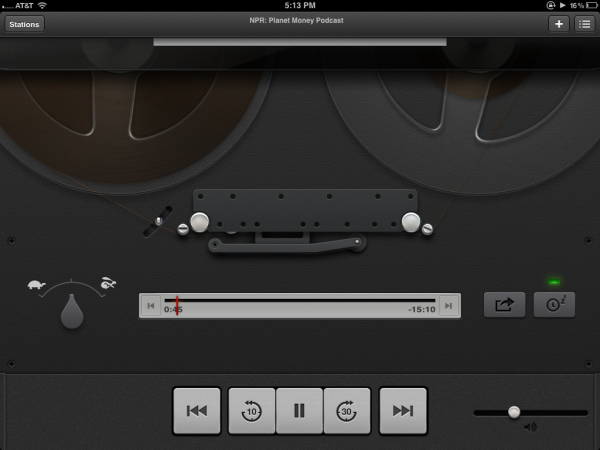

Radio stations worry about relevance in a digital age. The cachet of a spot on the FM dial can disappear in the seemingly infinite number of audio streams on the Internet.
Today transmission-tower owners can take some comfort that the most valuable company in the world considers the radio dial worth sustaining, at least metaphorically.
Apple spun off its long-neglected iTunes category today into a full-blown app for iPhone and iPad, appropriately named Podcasts. (You can download it now.) And it’s chock full of radio metaphors. The most popular podcasts are labeled “Top Stations.” Users can browse those stations by swiping across the “dial.” And, as you can see above, the playback display looks like a reel-to-reel. (The design is receiving mixed reviews.)
Apple has chuffed1 a lot of designers for nicking bits of real-world design for its iOS apps. Newsstand gets a walnut bookshelf; Notes gets that hideous marker font; Calendar looks like a tear-off desktop calendar.)
Defensible or not, those visual ties to the real world are meant to make the digital transition easier for less-savvy users. Podcasting has long had difficulty breaking beyond a core audience. Apple’s app reduces podcasting to one-tap simplicity: Users can now subscribe to podcasts right from the device, edging us closer to the “post-PC” world. The app also downloads new episodes to the device automatically, a missing feature that has caused much grumbling. Episodes can either be streamed or downloaded for offline consumption.
What does the app look like for news podcasts? Buried in the middle of the Top Stations “radio dial,” somewhere around 103.7 FM, is the News & Politics category, which currently features two NPR programs, Bill Maher, the BBC, and 60 Minutes.
Podcasts.app would seem to represent Apple’s renewed commitment to a medium sometimes accused of irrelevance. The desktop version of iTunes simplified podcasting somewhat back in 2005, abstracting away RSS feeds and MP3 downloads by providing a directory listing. The iOS app takes it a step further, untethering the user from a computer.
Now that Apple is shunting podcasts onto a private island outside of the iTunes iOS app, however, it may be more difficult for new users to discover the content. The Podcasts app won’t come preloaded on iDevices, unlike the separate Music and Video apps. (The same is true for iBooks, but users are prompted to download that app after turning on the device for the first time. It’s unclear if Podcasts will get the same treatment.) The podcasts section is apparently removed from iTunes altogether in the beta version of iOS 6 being shown to Apple developers.
“It’s tough to overstate how lazy and nervous people are about trying new forms of media, so I’m scared that separating podcasts from iTunes might mean a huge drop in people trying them out,” said Jesse Thorn, who makes a living from podcasts.
“My hope, though, is that the downside will be outweighed by a great, easy-to-use piece of stand-alone software,” he said.